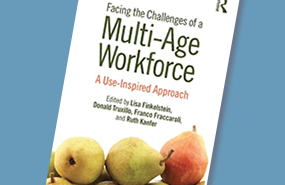 In an age of unprecedented longevity, a focus on lifelong individual financial security has never been more crucial. The Financial Security Center brings a unique interdisciplinary perspective to financial security issues facing our society by rethinking the perceived problems around an aging population, especially retirement planning and the need to work longer.
In an age of unprecedented longevity, a focus on lifelong individual financial security has never been more crucial. The Financial Security Center brings a unique interdisciplinary perspective to financial security issues facing our society by rethinking the perceived problems around an aging population, especially retirement planning and the need to work longer.
By understanding the role that research, education and policy can play in solving these issues and looking at the problems from multiple perspectives, we will drive the dialogue forward in order to facilitate a healthier state of long-term financial security for the individual and society.
2014-15 PROJECTS
Financial Capability and Literacy
Optimizing Retirement Income Solutions
 Optimizing Retirement Income Solutions was a follow-up project to “The Next Evolution in Defined Contribution Retirement Plan Design” completed in 2013-14, and the second project funded by the Society of Actuaries. This project, which culminated in a series of four papers, illustrates analyses that employers and their advisors can use to rationalize retirement income offerings in employer-sponsored defined contribution retirement plans. It identifies retirement income solutions that can be considered optimal according to certain specifications and can be implemented in employer sponsored retirement plans. Additional issue briefs/articles will follow-up on this project.
Optimizing Retirement Income Solutions was a follow-up project to “The Next Evolution in Defined Contribution Retirement Plan Design” completed in 2013-14, and the second project funded by the Society of Actuaries. This project, which culminated in a series of four papers, illustrates analyses that employers and their advisors can use to rationalize retirement income offerings in employer-sponsored defined contribution retirement plans. It identifies retirement income solutions that can be considered optimal according to certain specifications and can be implemented in employer sponsored retirement plans. Additional issue briefs/articles will follow-up on this project.
Applying behavioral economics research to improving health and financial outcomes
 “The MORE Design: Integrating Psychological Sciences and Behavioral Economics to Engineer Better Outcomes with Human Resource, Benefits and Retirement Programs” integrates the robust research on psychological science, behavior change and decision-making with recent research on various behavioral economics phenomena in order to address the issue of improving health and financial security. Many people don’t take appropriate steps to improve their health and financial security. As a result, individuals aren’t reaching the full potential of their lives, which creates substantial costs for both the individual and society.
“The MORE Design: Integrating Psychological Sciences and Behavioral Economics to Engineer Better Outcomes with Human Resource, Benefits and Retirement Programs” integrates the robust research on psychological science, behavior change and decision-making with recent research on various behavioral economics phenomena in order to address the issue of improving health and financial security. Many people don’t take appropriate steps to improve their health and financial security. As a result, individuals aren’t reaching the full potential of their lives, which creates substantial costs for both the individual and society.
This paper, which has been substantially completed and is under review, will be issued in 2016.
Financial “wellness” programs in the workplace
 The need for employers to consider expanding the menu of financial services provided to their employees is a newly emerging priority for senior human resource leaders. There have been a number of recent publications, including one from the Consumer Financial Protection Bureau, that promote the benefits for employers in creating a “Financial Wellness” program in the workplace. The Center convened a Launch Conference in September 2014 to discuss and debate how financial wellness programs can improve the financial security of employers and the resulting benefits to employers. Attendees identified a number of potential research topics as well as next steps that organizations themselves can implement immediately. Read the conference proceedings
The need for employers to consider expanding the menu of financial services provided to their employees is a newly emerging priority for senior human resource leaders. There have been a number of recent publications, including one from the Consumer Financial Protection Bureau, that promote the benefits for employers in creating a “Financial Wellness” program in the workplace. The Center convened a Launch Conference in September 2014 to discuss and debate how financial wellness programs can improve the financial security of employers and the resulting benefits to employers. Attendees identified a number of potential research topics as well as next steps that organizations themselves can implement immediately. Read the conference proceedings
Working Longer
Key factors influencing the decision to retire
 The Center is conducting a literature search and market survey in order to identify and categorize the financial and non-financial factors that influence an employee’s decision to retire. Special emphasis is on the behavioral and motivational aspects on the decision to retire, and how they interact with financial and health factors in the retirement decision. The goals of this project are to identify and categorize the factors that influence an employee’s decision to retire; to provide background to financial institutions to build tools and retirement readiness programs that will help clients make more informed decisions about retirement; and to inform human resource managers on how to better assist employees in the retirement decision-making process.
The Center is conducting a literature search and market survey in order to identify and categorize the financial and non-financial factors that influence an employee’s decision to retire. Special emphasis is on the behavioral and motivational aspects on the decision to retire, and how they interact with financial and health factors in the retirement decision. The goals of this project are to identify and categorize the factors that influence an employee’s decision to retire; to provide background to financial institutions to build tools and retirement readiness programs that will help clients make more informed decisions about retirement; and to inform human resource managers on how to better assist employees in the retirement decision-making process.
Financial Fraud Research Center (FFRC)
The work of the FFRC has continued with the support of the FINRA Foundation. We have decided to weave the work of the Financial Fraud Research Center into the overall Financial Security program and no longer manage it as a separate entity. Our critical area for investigation in 2014-15 has been the creation of a fraud categorization scheme.
Fraud Survey Project
 As previously reported, the Center has been working on a survey research project funded by the FINRA Foundation that assesses whether, and to what extent, modifications to survey design and context will affect self-reported rates of individual fraud victimization. The Center released an issue brief of key findings in October 2014 and presented an academic paper at the annual meetings of the Gerontological Society of America in November. The academic paper has been accepted for publication in The Gerontologist.
As previously reported, the Center has been working on a survey research project funded by the FINRA Foundation that assesses whether, and to what extent, modifications to survey design and context will affect self-reported rates of individual fraud victimization. The Center released an issue brief of key findings in October 2014 and presented an academic paper at the annual meetings of the Gerontological Society of America in November. The academic paper has been accepted for publication in The Gerontologist.
A Taxonomy of Fraud – Working Group Meeting
 The absence of common definitional standards for fraud types has made it difficult to compare various survey and reporting instruments. Working with the FINRA Foundation and The Bureau of Justice Statistics’ “National Crime Victimization Survey” team, the Center convened a small working group of experts to define a standard taxonomy that can be used by those managing reporting and survey instruments. The first meeting was held in Washington D.C. in January 2015. The creation of the taxonomy and associated report has been an iterative process incorporating cycles of feedback from working group members and an external review committee of experts. The goal is to have a completed, verified taxonomy scheme for the Dept. of Justice/Bureau of Justice Statistics to use in their 2016 National Crime Victims Survey.
The absence of common definitional standards for fraud types has made it difficult to compare various survey and reporting instruments. Working with the FINRA Foundation and The Bureau of Justice Statistics’ “National Crime Victimization Survey” team, the Center convened a small working group of experts to define a standard taxonomy that can be used by those managing reporting and survey instruments. The first meeting was held in Washington D.C. in January 2015. The creation of the taxonomy and associated report has been an iterative process incorporating cycles of feedback from working group members and an external review committee of experts. The goal is to have a completed, verified taxonomy scheme for the Dept. of Justice/Bureau of Justice Statistics to use in their 2016 National Crime Victims Survey.
World Economic Forum, Global Agenda Council “Future of Asset Management and Insurance
 Martha Deevy continued her participation on the Future of Asset Management and Insurance Global Agenda Council. The work of the council focused on examining the current challenges faced by long term institutional investors resulting from the worldwide financial crisis and the development of a set of policy recommendations that can resolve the imbalances between short term investors and long term investors. This work will be on the World Economic Forum Davos agenda in January 2016.
Martha Deevy continued her participation on the Future of Asset Management and Insurance Global Agenda Council. The work of the council focused on examining the current challenges faced by long term institutional investors resulting from the worldwide financial crisis and the development of a set of policy recommendations that can resolve the imbalances between short term investors and long term investors. This work will be on the World Economic Forum Davos agenda in January 2016.
Facing the Challenges of a Multi-Aged Workforce: A Use Inspired Approach
 Laura Carstensen, Michaela Beals and Martha Deevy contributed a chapter “Optimizing Older Workers” in the book Facing the Challenges of a Multi-age Workforce published in 2015. Read more
Laura Carstensen, Michaela Beals and Martha Deevy contributed a chapter “Optimizing Older Workers” in the book Facing the Challenges of a Multi-age Workforce published in 2015. Read more